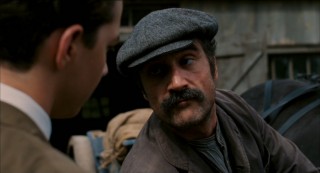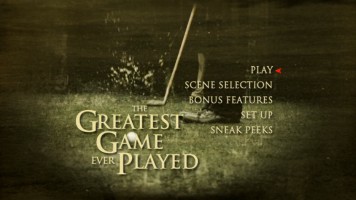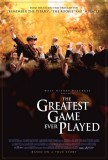The Greatest Game Ever Played, one of the latest films in Disney's recent wave of real life sports dramas, has a subject that not many people are likely to know about today. It details the remarkable rise of Francis Ouimet, from working class caddie to 1913 U.S. Open golf champion. Underdog triumphs in sports are no stranger to cinema and Ouimet's unique, appealing, American success story probably led Walt Disney Pictures to adapt Mark Frost's best-selling novel, published in 2002 by Disney's literary branch Hyperion, in spite of a few discouraging facts. Chief among these are that professional golf does not currently rank high on the list of people's favorite spectator sports and that when a similar path was taken for 2000's The Legend of Bagger Vance (best-selling book, period golf setting), even bankable stars Will Smith and Matt Damon couldn't save the film from grossing a mere half of its $60 million budget domestically.
Greatest Game seems mildly aware of these initial strikes it has against it. Accordingly, it strives to make itself a tale of class struggles as much as it is about swinging clubs and getting a tiny ball in a barely larger hole. The first image it depicts is of a young English boy being shunned by golfers and made to feel worthless. That boy grows up to be Harry Vardon (Stephen Dillane), a repeat professional golf champion who figures as the second most prominent character in the movie. Nicknamed "The Stylist" and renowned on both sides of the Atlantic Ocean for his incomparable skills, Vardon nonetheless has the baggage of being a working class man in an elitist game. His search for acceptance parallels that of Francis Ouimet (Shia LaBeouf), the film's 20-year-old American protagonist.
Ouimet is taught by his immigrant father (Elias Koteas) from a young age about the value of hard work. But even paternal disapproval can't get Francis to give up his passion for golf, something he harbors through many years of caddying at the golf course across the street from the Ouimets' home in Brookline, Massachussetts. Once the obligatory backstory and unconvincing young Shia LaBeouf stand-in have run their courses, the movie lays its focus on the path to the U.S. Open. Overseas, the stuffy Lord Northcliffe (Peter Firth, no relation to Colin) is choreographing an English victory with hopes that it will bring him personal gain. He enlists the services of the soft-spoken Vardon and the burly Ted Ray (Stephen Marcus), whose entrance into the tournament demands a scheduling change and immediately makes them the favorites.


In the U.S., Ouimet is jazzed about the possibility of being a part of the Open, having been trained by his workplace's weathered pro (Luke Askew). A number of obstacles must be overcome: a stiff $100 entry fee, the disdain of the governing powers, and the lingering doubts of Francis's father. Though Ouimet narrowly misses qualifying and ends up working in retail, a second chance is posed and the allure of playing alongside his childhood idol Vardon proves too strong to turn down. It's utterly clear where this is all leading for the passionate amateur golfer up against the odds.
To tell the story and make it more palpable, other characters (or caricatures) are thrown into the mix: Bernard Darwin (Robin Wilcock), the British reporter Northcliffe has assigned to cover Vardon's anticipated success; John McDermott (Michael Waver), a fiery red-headed American who is looking to win the Open for a third straight year; Sarah Wallis (Peyton List), the obligatory love interest clearly fabricated for this film, who takes a liking to Francis unlike the rest of her prejudiced family; and most significantly, Eddie Lowery (Josh Flitter), a spunky, pint-sized 10-year-old truant who becomes Francis's caddie out of what feels like an anachronistic appeal for the support of younger viewers. But ultimately, this is Francis's film, even with some amount of character development granted to Vardon. And down through the three-way playoff final, which Darwin describes as "David versus two Goliaths", the outcome is naturally never in doubt.
Greatest Game proceeds like a a series of attempts to make golf seem exciting for someone not playing it. In his sophomore directorial effort, Bill Paxton, the longtime actor best known for his work in James Cameron films, employs a number of techniques to raise the stakes for a methodical activity that has long been of niche interest. All the CGI and editing tricks, which are liberally and often needlessly summoned, can't raise the excitement level enough. The movie is never as boring as one might fear, but never interesting enough to make the endeavor feel worthwhile, in spite of the story's measurable appeal. Part of that may be because, for all the tinkering that can be done, this is still primarily about a stuffy bunch of white men. They are surrounding a kid who doesn't look like he's 20 but whose character seems headed down the same path. As a result, the viewer might wonder not only why he or she is supposed to care, but just why so many reporters and countrymen are so invested in golf and this one tournament.
Various layers can be detected, from American/Britain unease to the two-way bias the haves and have-nots hold for each other to the contrast of Francis's supportive mother and disapproving father, and while these add depth, they don't make for a thoroughly gripping or original presentation.


The cast of Greatest Game leaves a bit to be desired. It's tough to watch Shia LaBeouf try drama and struggle while being aware of his remarkable comedic prowess. Though one hopes this decent performance will further his career, it seems like a turn that should come after years and years of providing laughter. This project may be the polar opposite to LaBeouf's clever Disney Channel series "Even Stevens" and it feels like a misuse of his great talent, for his unique comedic flair he has previously shown goes untapped (for good reason or not) and his character isn't really relatable enough to merit the sympathy the movie seeks to elicit. It's difficult to understand or appreciate Francis's motivations; why he loves golf and admires Vardon, for instance. The movie suffers on account of this, for the lead falls closer to "boring" than being someone we can warm to.
As his father, Elias Koteas, usually known for his range and expressiveness, gets bogged down in a fake-sounding French accent and a one-note character. The quest for paternal acceptance is a backdrop, but it's obvious that approval (like the U.S. Open) will be won, in spite of Mr. Ouimet's disdain for the upper class and golf. On the other hand, the two British pros are capably depicted. Stephen Dillane revels in restraint and makes the gentlemanly Vardon
an unexpectedly sympathetic foe, even if the movie goofily summons ghosts to illustrate the pretentious doubters of his youth that haunt him. As Ted Ray, Stephen Marcus gets to portray perhaps the film's boldest persona, and he does so without breaking the mood.
The Greatest Game really does have its fair share of good and bad qualities. Among the positives, the film never gets bogged down in the specifics of golf but (rightfully) expects you to follow along. Among the negatives, it's never as terse as it could be, the climax goes on far too long, the style feels a bit heavy, and despite giving off the air that its not, the movie is still basically a by-the-numbers underdog story. The invented romance subplot is not explored enough to justify its presence, and this is indicative of the basic problem with the screenplay by author Mark Frost (whose career has taken him all over the place, from Minneapolis's Guthrie theatre to David Lynch's cult favorite "Twin Peaks" and now the big screen Fantastic Four and its forthcoming sequel). It aims to balance historical accuracy with the expectations and hopes of a modern audience. The end result is that the entire movie feels like formula (albeit grounded in almost too-good-to-be-true reality) crossed with efforts to make golf exciting. Neither is especially appealing and only those who already love golf may leave fulfilled.
 |
DVD Details
1.85:1 Anamorphic Widescreen
Dolby Digital 5.1 (English, French)
Subtitles: English, French; Closed Captioned
Release Date: April 11, 2006
Single-sided, dual-layered disc (DVD-9)
Suggested Retail Price: $29.99
Black Keepcase with Side Snaps
|
VIDEO and AUDIO
The Greatest Game Ever Played is presented in its original theatrical aspect ratio of 1.85:1 and enhanced for 16x9 widescreen displays. Disney isn't even bothering with a fullscreen release, a move that can be deemed unusual the past few years. I didn't have any major problem with the picture quality here. I noticed a tiny bit of moiré effect and some minor ringing around letter edges, but that's about it. The film isn't quite as visually compelling as you might expect, but then much of it does take place on a golf course, which can only provide so much eye candy. In a pleasant departure from the limited palettes often used to depict the olden days, the colors here are supersaturated. It gives things a vitality that does not betray the thoroughly- constructed period world. The satisfying presentation also boasts a basically unsullied element, and a sharp, detailed picture which holds up through the fair share of dark moments.
As far as sound goes, there is a serviceable Dolby Digital 5.1 track offered. The sound field is mostly restricted to the front speakers. There aren't as many ambient noises as you'd expect. Nevertheless, the sometimes overdramatic but usually supportive score widens things up a bit, as does the occasional dimensional effect. The mix is marked by dynamic peaks and valleys; volume needs to be turned up a bit during the quieter moments, while other points are jarring enough to awaken a viewer from a bore- induced stupor, if such a thing should ever occur from a golf movie.



BONUS FEATURES, MENUS and PACKAGING
For a film which had a low budget and did not make much of a dent at the box office, The Greatest Game Ever Played has been treated to a surprisingly full and worthwhile slate of bonus features
on DVD. Chalk it up to the serious and historical natures of the movie and the fact that Buena Vista Home Entertainment is currently equipping the latest live action Disney films with a two audio commentaries each (at least for the class's two latest and two next entries).
First up is "A View from the Gallery: On the Set of The Greatest Game Ever Played" (15:20), a solid general making-of featurette. It basically gives director Bill Paxton free rein to highlight and compliment the film's production design, music, costume design, editing, visual effects and acting. But, it is interesting to consider all these aspects that went into creating this period piece and making its sports imagery convincing. It's also neat to hear about Paxton's intentions to make the story leap off the page and Shia LaBeouf amusingly retell how he lied about his golf history to get the role. While there is inevitably some overlap with Paxton's commentary, this more succinct piece has merit of its own without shattering conventions.
"Two Legends and the Greatest Game" (6:46) paints a picture of the real Harry Vardon and Francis Ouimet by recalling the facts which are maintained in the film and pondering the pair's legacies and impact on golf. It ends with and, as it to be expected, focuses more on Ouimet. If its narration is not overflowing with revelation, its images hold enough power to sustain this brief clip.
Rounding out the video extras is "From Caddie to Champion: Francis Ouimet" (25:15), a vintage television broadcast from 1963. Commemorating the 50th anniversary of Ouimet's surprise US Open victory, this black and white report catches up with the golfer at age 70. Ouimet talks about how the game has changed by reflecting upon old time golf clubs (the swinging devices, not the institutions) and their strange names. The second half recreates the 1913 championship match, as Ouimet and host Fred Cusick walk around the actual Massachussetts golf course where it occurred. With surprising detail down to individual shots on each hole, Ouimet enthusiastically recalls his unexpected triumph. It's definitely rewarding to get a vintage and extremely relevant bonus like this, which should especially appeal to golf fans. In fact, even though the title and packaging give little indication of its intrigue, this first-hand interview is one of the coolest DVD supplements I can remember coming across. Naturally, this makes the occasional buzzing and intermittent strange squeaky slurping sounds which date the audio easy to overlook.


Finally and most significantly are the aforementioned pair of audio commentaries. When a disc is equipped with two commentaries and both are carried by single speakers, the initial thought may be to pair them up. That's certainly how I anticipated feeling. But in this instance, offering separate tracks seems like a wise move, since both filmmakers (director Bill Paxton and author/screenwriter/producer Mark Frost) say enough to fill a solo track and choose to focus on different aspects so that repeat remarks are kept to a minimum.
Paxton's track focuses squarely on the filmmaking, with the veteran actor citing no shortage of his cinematic influences, many of which feature him. Paxton resorts to narrating the film in some instances (which actually does serve to explain things that are not spelled out) and quoting lines along with it (illustrating his high opinion of the final product). He also misses no chance to give praise to each cast and crew member as pertinent to what is on screen (Luke Askew need never worry about how the director feels about him). But those may be the only drawbacks to an otherwise highly informative discussion of the film. Paxton has a story about every actor, down to who is wearing a fake mustache. He also points out a great number of digital elements (basically every golf ball seen), and one background rollerblader for whom digital removal proved unaffordable. Clearly, the ever-relevant issues of class differences and prejudices appear to be of interest to him. In addition to proposing some interesting levels on which to view the film, such as its parallels to a Camelot tale or Star Wars, Paxton likes to credit his various inspirations (from Hitchcock to the Beatles movies, from Titanic to Tombstone). He's also candid about which facts were tinkered with to conform with sports drama conventions and even teasingly mentions a couple of deleted scenes which are not on the DVD. Through it all, the director remains fairly easy to listen to, even when he takes his Tombstone analogies too far.
Commentary #2, by Mark Frost, focuses more on the history behind the film. Frost too points out when artistics licenses are taken, or rather, he does the opposite by regularly underscoring how the events depicted really did occur. The research which formed the basis for Frost's book is consistently called upon, as the writer contextualizes how different golf and America was back then. One again gets the sense that inequities of the class system are more the focus than golf, but Frost does at least seem to have a penchant for the game. While he purports to talk about translating the book to the screen, Frost's most fascinating revelations have more to do with the real personalities portrayed in the film, such as his discussion about McDermott's mental breakdown, Lord Northcliffe's syphilic comeuppance, Ouimet's subsequent two-year USGA suspension, and the fact that reporter Darwin was the grandson of the famed evolution theorist Charles. Complementing both the film and the other bonus features, Frost's educational reflections hold much value for anyone interested in hearing more about the actual subject.
The Main and Bonus Features menus opt for the same fast-cut approach that the film occasionally montages with. Not only do they make it tough to find a good review screencap, but they also seem like an all too common sports drama menu design choice, complete with restrained palettes. The Main Menu excerpts a Western-type segment of Brian Tyler's score, while submenus choose for calmer selections. The disc, of course, opens with previews of other Disney properties. These advertise Cars, Pirates of the Caribbean: Dead Man's Chest, Glory Road, and The Chronicles of Narnia: The Lion, The Witch and The Wardrobe. The Sneak Peeks menu holds these plus promos for AirBuddies and Walt Disney World Golf. (Maximizing synergy inside the case is a mini insert for Glory Road and ESPN Golf Schools.)


CLOSING THOUGHTS
The Greatest Game Ever Played won't win over many viewers who don't already have a soft spot for underdog sports dramas or golf, but it's an okay movie all the same. The story is worth considering and if the approach (period authenticity meets CGI-fueled filmmaking techniques) isn't the wisest, the film can't be faulted for being entirely trite and utterly boring. Still, the reliance upon some formulas and the inherently predictable nature of the film's design do detract from the proceedings and give off an air of familiarity, despite the stylistically different execution.
On DVD, Greatest Game has been treated to a disc that shouldn't disappoint anyone fond of the film. Video and audio, while not quite perfect, are, as expected, extremely good. As far as bonuses go, two very informative commentaries, a standard making-of featurette, and a fascinating vintage broadcast appear to cover all the bases of this film's production and the real people who inspired it nearly one hundred years ago. As such, the DVD is easily recommended for those who like the film or true sports dramas, and merits a rental for anyone with an interest.
More on the DVD / Buy from Amazon.com












